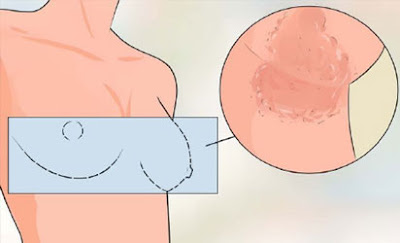Fungal infections of breasts might be quite embarrassing and uncomfortable.
A breast fungus is a common term for a fungal infection of the skin overlying the breast. It does not imply an infection of the deeper breast tissue. The area under the breast (inframammary fold) is particularly prone to fungal infections in women for a number of reasons that makes this region ideal for fungi to thrive. Most fungal skin infections persist without medical treatment therefore it has to be diagnosed and treated as soon as possible. The infection can spread to eventually affect the top of the breast and even the cleavage. One of the consequences of a long term fungal skin infection is a dark discoloration of the skin which can be unsightly. There are usually no other significant complications of a breast fungus.Causes of fungal infection under the breast: If you spot the signs of itchiness, rashes, pain, some discharge of the breast, or flaky skin, then you might have a fungal infection. It can sometimes affect the skin and provoke an unpleasant odour. Preventive measures If you think and suspect that you might have this problem, it’s best to take preventive measures in order to prevent a recurrence. Despite everything, no one would like to fiddle with their bra and discreetly itch while dealing with people at home or trying to look professional at the workplace. Common causes of fungal infections on the breast: Fungal infections or yeast of the breast occur as a result of fungi accumulation and thriving in the warmer skin areas. Usually, this happens when you have not dried off properly, or when your bra is not fitting right and thus it causes moisture and sweating. Also, large-breasted women are disposed to fungal infections on the breast because they carry around some extra weight. One of the main kinds of fungal infections which strike the breast is because of dermatophytes. One such fungal infection is ringworm which causes ring-shaped lesions on your skin and at the same time, it might transfer from your skin to anywhere else on your body. Another type of fungal infection which is caused by the Candida albicans is the main responsible for thrush, on the nipple the breast and privates. Nipple damage might cause breast thrush as well. People who have already finished a course of antibiotics can develop this problem as well, because of the loss of ‘good’ bacteria within the body. Symptoms to watch out for: You will feel the fungal infections, but in case you are not sure how to differentiate between them from the rest of routine allergies rashes, then pay attention to these symptoms: *Itching or burning of the breast and its surrounding skin, especially below the breast. *Cracking or peeling skin *Red skin rash *Skin discoloration *Unbearable pain in one or both breasts *Pain after nursing your baby *A dark skin surrounding the nipple Cracked or flaky nipples *Musty odour below the breast. *Thin discharge from the breast. Prevention: Here are some simple things to do in order to reduce the risk of development of a fungal infection on the breast: *After each bath or shower, dry up properly *If you sweat a lot, change your bra and swap the damp one more often for a fresh, clean, and dry one *Wipe the breast carefully before you put and wear the new one. *To absorb sweat, use only unscented powders *Don’t spray deodorants and perfumes to the already affected and sensitive area.

No comments:
Post a Comment